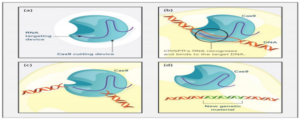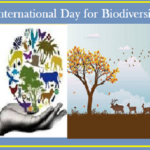In the bustling laboratories of today, a quiet revolution is unfolding, promising to reshape the landscapes of medicine and agriculture by 2050. CRISPR (Clustered Regularly Interspaced Short Palindromic Repeats), a groundbreaking gene-editing technology, is at the forefront of this transformation. This powerful tool allows for precise modifications to DNA, enabling scientists to correct genetic defects, combat diseases, and enhance crop resilience. As we look ahead to the mid-21st century, CRISPR’s impact on healthcare and food security is becoming increasingly profound.
Transforming Medicine: A New Era of Genetic Therapies
CRISPR’s most immediate and profound impact is in the realm of medicine. By allowing precise edits to the genome, CRISPR opens the door to curing genetic diseases that have long been deemed incurable. One of the most promising applications is in the treatment of sickle cell anemia, a debilitating condition caused by a single genetic mutation. Researchers are already conducting clinical trials where CRISPR is used to correct the defective gene in patients’ blood cells, offering hope for a permanent cure.Beyond single-gene disorders, CRISPR holds potential for tackling complex diseases such as cancer. By editing the genes of immune cells to enhance their ability to target and destroy cancer cells, scientists are developing innovative immuno therapies.

- The CRISPR system has two components joined together: a finely tuned targeting device (a small strand of RNA programmed to bind to a specific DNA sequence) and a strong cutting device (an enzyme called Cas9 that can cut through a double strand of DNA at the binding site);
- Once inside a cell, the CRISPR system locates the DNA it is programmed to find. The CRISPR seeking device recognizes and binds to the target DNA (circled, black); (c) The Cas9 enzyme cuts both strands of the DNA; (d) Researchers can insert into the cell new sections of DNA. The cell automatically incorporates the new DNA into the gap when it repairs the broken DNA.
For example, CRISPR is being used to create CAR-T cells, a type of immune cell engineered to recognize and attack specific cancer cells. These advancements not only promise more effective treatments but also fewer side effects compared to traditional therapies.CRISPR is also revolutionizing the field of infectious diseases. The COVID-19 pandemic underscored the need for rapid and flexible responses to viral outbreaks. CRISPR-based diagnostics have been developed to quickly and accurately detect viruses like SARS-CoV-2, enabling timely interventions. Furthermore, researchers are exploring CRISPR’s potential to directly target and destroy viral DNA within infected cells, offering a novel approach to antiviral therapies.
Agricultural Innovation: Ensuring Food Security for the Future
As the global population marches towards an estimated 9.7 billion by 2050, ensuring food security becomes paramount. CRISPR technology is playing a critical role in developing crops that can withstand the challenges of climate change, pests, and diseases. This agricultural innovation is crucial for maintaining and increasing food production in the face of growing environmental pressures.One of the most significant contributions of CRISPR to agriculture is the development of drought-resistant crops. Scientists have successfully edited the genomes of crops like wheat and rice to enhance their tolerance to water scarcity. These genetically modified crops can maintain high yields even in arid conditions, ensuring stable food supplies in regions prone to drought.Pest resistance is another area where CRISPR is making strides.
Traditional pesticides pose environmental and health risks, and pests often develop resistance over time. CRISPR allows for the creation of crops that are inherently resistant to pests by targeting and altering specific genes. For instance, researchers have used CRISPR to develop corn varieties that produce a natural insecticide, reducing the need for chemical pesticides and minimizing ecological impact.CRISPR is also being utilized to improve the nutritional content of crops. Biofortification, the process of increasing the nutritional value of food crops, can help address malnutrition in developing countries. For example, scientists have edited the genome of rice to produce “Golden Rice,” which is enriched with vitamin A, combating deficiencies that cause blindness and other health issues in millions of children worldwide.
Ethical and Regulatory Considerations
While the potential benefits of CRISPR are immense, the technology also raises ethical and regulatory questions. The ability to edit the human genome brings forth concerns about “designer babies” and genetic enhancement. Ensuring that CRISPR is used responsibly, with strict ethical guidelines and regulatory oversight, is crucial to prevent misuse and ensure equitable access to its benefits.In agriculture, the introduction of genetically modified organisms (GMOs) remains a contentious issue. Public perception and regulatory frameworks vary globally, impacting the adoption of CRISPR-edited crops. Transparent communication about the safety and benefits of these innovations is essential to gain public trust and acceptance.
Looking Ahead: CRISPR’s Role in a Sustainable Future
As we approach 2050, the integration of CRISPR technology into medicine and agriculture is set to revolutionize these fields, offering solutions to some of the most pressing challenges facing humanity. In medicine, CRISPR promises cures for genetic diseases, innovative cancer treatments, and new defenses against infectious diseases. In agriculture, it offers tools to create resilient, nutritious, and high-yielding crops, essential for feeding a growing population under changing climatic conditions.The journey of CRISPR is just beginning, but its potential to transform our world is undeniable. By harnessing the power of precise genetic editing, we are taking bold steps towards a healthier, more food-secure future. The continued advancement and ethical application of CRISPR technology will be crucial in realizing its full potential, ensuring that the benefits are shared globally and equitably.
(Author is Scientist- MRCFC- khudwani SKUAST- Kashmir. Visiting Scientist, University of Nebraska Lincoln-USA. Email: [email protected])








